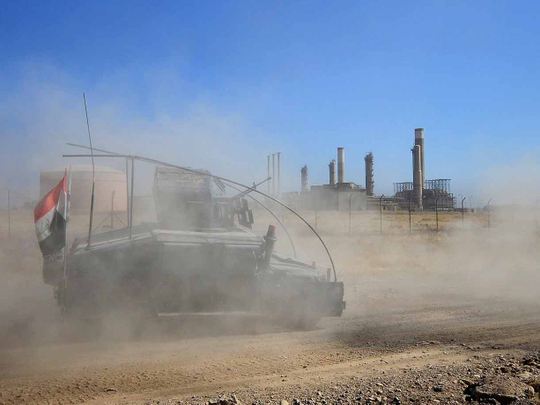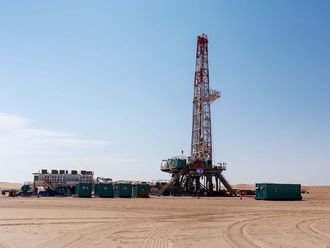
Iraqi forces moved to take over oil fields near the northern city of Kirkuk from Kurdish fighters and said they’ve captured a refinery and other facilities in the petroleum-rich province. Crude exports from the disputed area were flowing normally on Monday.
State-run Iraqiya television said the Iraqi military has also captured a gas plant and a main road in Kirkuk, which has emerged as a flashpoint in the power struggle between the federal government in Baghdad and the Kurdistan Regional Government. Kirkuk’s oil fields and deposits inside the adjacent Kurdish region were exporting about 600,000 barrels a day through a Kurd-controlled pipeline to Turkey, according to a person familiar with the matter, asking not to be identified because the information is private.
Iraqi troops and allied militias are advancing on Kirkuk, home to Iraq’s oldest-producing oil fields, amid an already-tense showdown between the central government and the semi-autonomous KRG following a Kurdish referendum on independence from Iraq on Sept. 25. The KRG included Kirkuk on the vote, despite competing territorial claims to the area.
While there was no halt to oil exports in the early stage of the military advance, the potential for disruptions sent Brent crude as much as 1.7 percent higher to $57.84 a barrel in London. The benchmark gained 2.8 percent last week.
‘Complex Issue’
“Tensions are definitely escalating in Iraq at the moment, and it will be a supporting factor for oil prices for the time being,” said Kim Kwangrae, a Seoul-based commodities analyst at Samsung Futures Inc. “It’s a complex issue.”
The Kurds are pumping about 120,000 barrels a day in Kirkuk, while the federal government produces about 60,000 barrels at wells they control in the area, said Jaafar Altaie, managing director of Abu Dhabi-based consultant Manaar Group. With the Kurdish region itself pumping some 350,000 barrels a day, mainly at its Taq Taq and Tawke fields, exports from Kirkuk and Kurdish deposits together total some 450,000 barrels a day, he said.
Prime Minister Haider Al Abadi ordered Iraqi forces to impose security in Kirkuk in cooperation with Kurdish Peshmerga forces, state television reported late Sunday, adding that government troops had captured areas in the city without a fight. The Kurdish Rudaw news service said at least seven Iraqi militiamen were killed south of Kirkuk, citing an unidentified Peshmerga commander.
The Kurdistan Security Council said late Sunday that Iraqi forces and Shiite militias intend to take over a military base near the oil fields. Earlier, al-Abadi’s office had accused the Kurds of deploying militants from the Turkish PKK organization, saying that was considered a declaration of war against Iraq.












